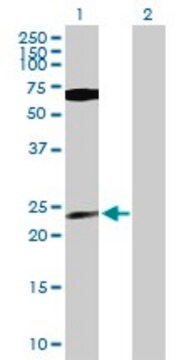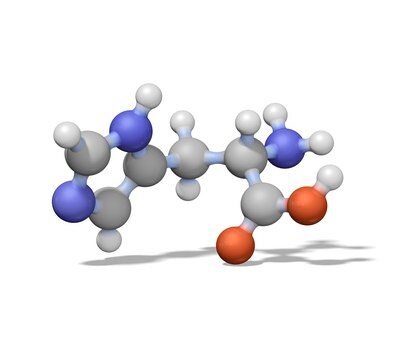P7607
Monoclonal Anti-Protein Phosphatase 1α antibody produced in mouse
clone PPI-377, ascites fluid
Synonym(e):
Anti-PP1α
About This Item
Empfohlene Produkte
Biologische Quelle
mouse
Konjugat
unconjugated
Antikörperform
ascites fluid
Antikörper-Produkttyp
primary antibodies
Klon
PPI-377, monoclonal
Mol-Gew.
antigen 37.5 kDa
Enthält
15 mM sodium azide
Speziesreaktivität
rabbit, rat, bovine, human, mouse, monkey
Methode(n)
immunocytochemistry: suitable
microarray: suitable
western blot: 1:500 using mouse fibroblasts cell extract
Isotyp
IgG2b
UniProt-Hinterlegungsnummer
Versandbedingung
dry ice
Lagertemp.
−20°C
Posttranslationale Modifikation Target
unmodified
Angaben zum Gen
human ... PPP1CA(5499)
mouse ... Ppp1ca(19045)
rat ... Ppp1ca(24668)
Allgemeine Beschreibung
Monoclonal Anti-Protein Phosphatase 1α specifically recognizes an epitope within the catalytic subunit of PP1α isoform (37.5 kDa).
Spezifität
Immunogen
Anwendung
Western Blotting (1 paper)
Haftungsausschluss
Sie haben nicht das passende Produkt gefunden?
Probieren Sie unser Produkt-Auswahlhilfe. aus.
Lagerklassenschlüssel
10 - Combustible liquids
WGK
nwg
Flammpunkt (°F)
Not applicable
Flammpunkt (°C)
Not applicable
Hier finden Sie alle aktuellen Versionen:
Analysenzertifikate (COA)
Die passende Version wird nicht angezeigt?
Wenn Sie eine bestimmte Version benötigen, können Sie anhand der Lot- oder Chargennummer nach einem spezifischen Zertifikat suchen.
Besitzen Sie dieses Produkt bereits?
In der Dokumentenbibliothek finden Sie die Dokumentation zu den Produkten, die Sie kürzlich erworben haben.
Unser Team von Wissenschaftlern verfügt über Erfahrung in allen Forschungsbereichen einschließlich Life Science, Materialwissenschaften, chemischer Synthese, Chromatographie, Analytik und vielen mehr..
Setzen Sie sich mit dem technischen Dienst in Verbindung.








